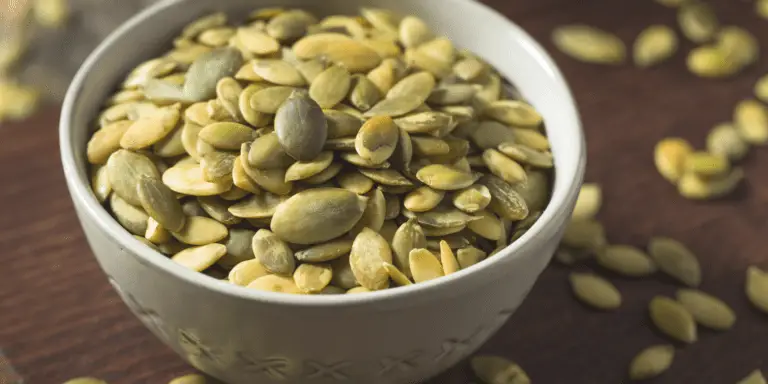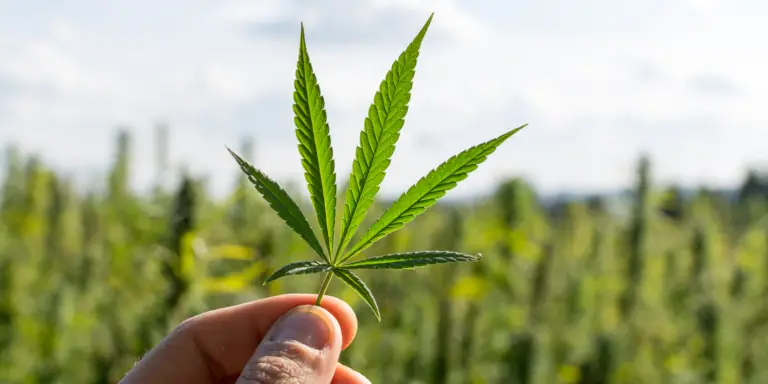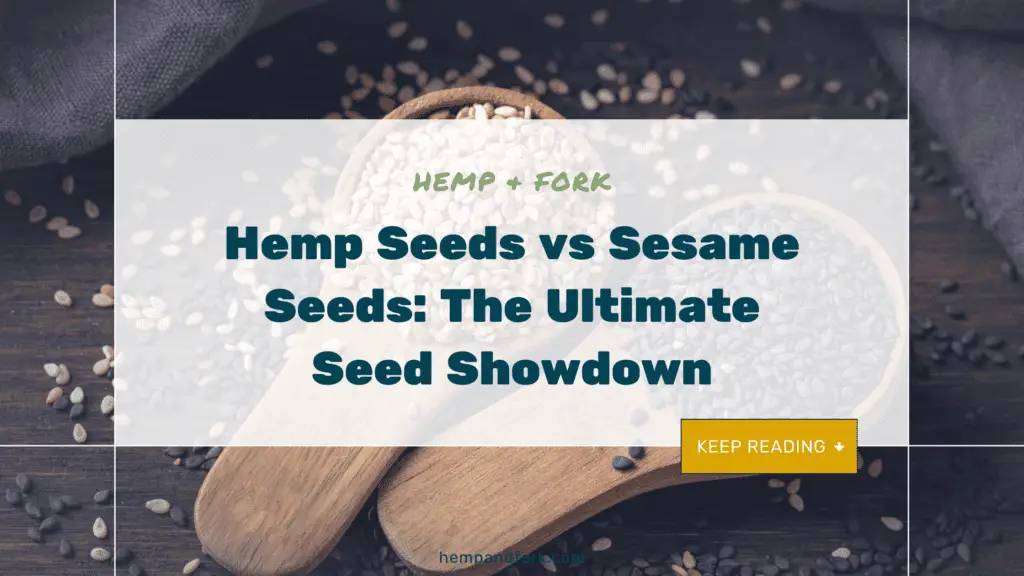
In today’s health-conscious society, the role of seeds in a healthy diet is increasingly recognized. These tiny powerhouses are packed with essential nutrients and offer a myriad of health benefits. In this comprehensive guide, we’ll delve into the nutritional profiles of two particularly popular seeds: hemp seeds vs sesame seeds.
If you’re keen on understanding how hemp seeds stack up against other types of seeds, don’t miss our in-depth articles on Hemp Seed vs Flax Seed, Hemp Seeds vs Pumpkin Seeds, and Hemp Seeds vs Chia Seeds.
- Hemp seeds excel in protein content and balanced fatty acids, making them ideal for heart and brain health.
- Sesame seeds are rich in calcium and antioxidants, offering unique benefits for bone health and overall wellness.
- Both hemp and sesame seeds are incredibly versatile and easily incorporated into a variety of dishes to enhance nutritional value.
Nutritional Overview of Hemp Seeds
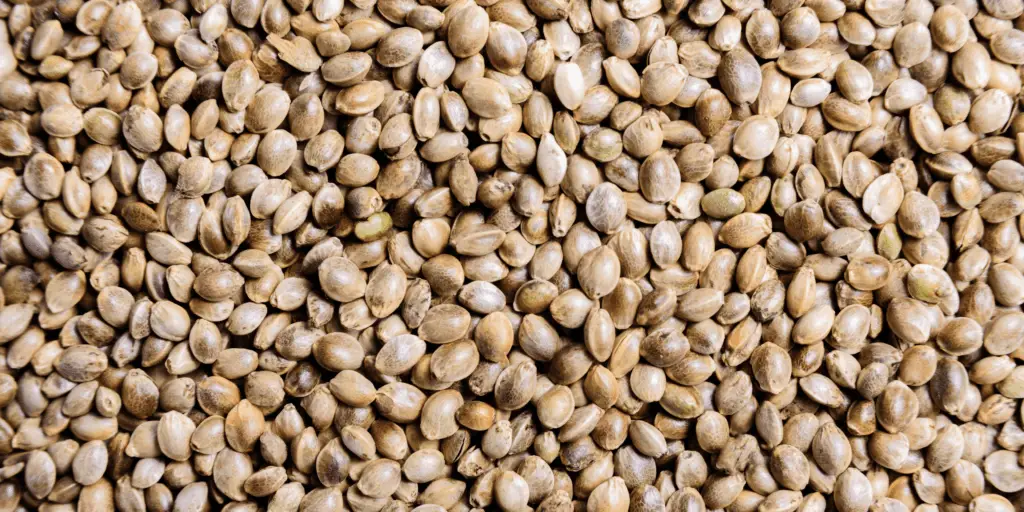
| Nutritional Factors | Amount/Level |
|---|---|
| Protein (per 30g) | 10g |
| Carbohydrates (per 30g) | 2g |
| Fats (per 30g) | 15g |
| Omega-3 Fatty Acids | High |
| Omega-6 Fatty Acids | High |
| Calcium | Moderate |
| Magnesium | High |
| Iron | High |
| Vitamin E | Moderate |
Protein Content
When it comes to protein, hemp seeds are a great source, boasting a complete amino acid profile. A single 30-gram serving provides approximately 10 grams of protein, making them an excellent choice for vegetarians, vegans, and anyone looking to boost their protein intake.
Fatty Acid Profile
Hemp seeds have a remarkable fatty acid profile and are rich in healthy fats like omega-3 and omega-6 fatty acids. These essential fatty acids are crucial for heart health, brain function, and inflammation control, making hemp seeds a balanced and nutritious option.
Vitamins and Minerals
Hemp seeds are a treasure trove of essential vitamins and minerals. They are particularly high in magnesium, which is essential for bone health and energy production, calcium for strong bones and teeth, and iron, which is vital for oxygen transport in the blood.
Health Benefits
Health benefits of the nutty hemp seed are numerous and wide-ranging. They are excellent for heart health due to their omega-3 fatty acid content, help in blood sugar control as they are low in carbohydrates, and aid in digestive health thanks to their high dietary fiber content.
🌟 For more information on the benefits of hemp, check out this article: 13 Hemp Heart Benefits: The Ultimate Guide
Nutritional Overview of Sesame Seeds
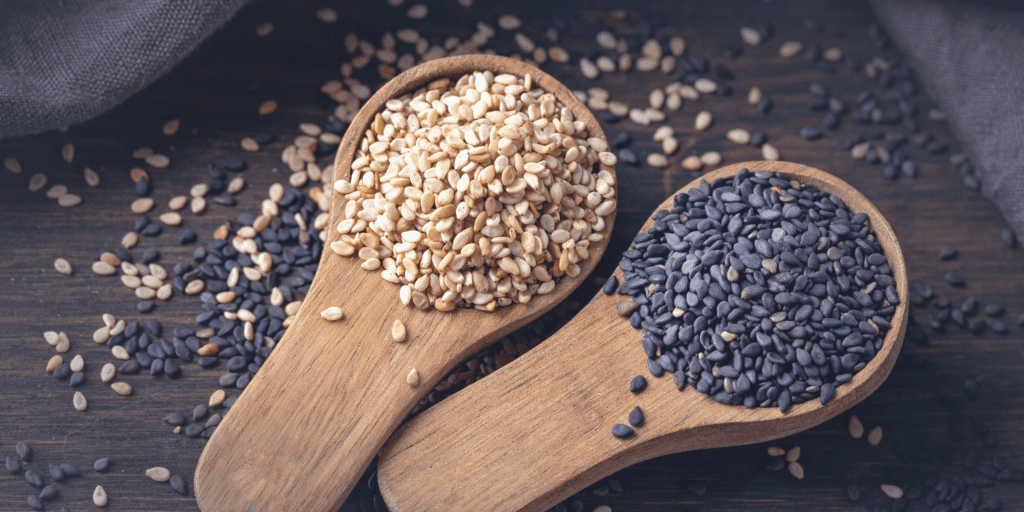
| Nutritional Factors | Amount/Level |
|---|---|
| Protein (per 30g) | 5g |
| Carbohydrates (per 30g) | 6g |
| Fats (per 30g) | 14g |
| Omega-3 Fatty Acids | Low |
| Omega-6 Fatty Acids | High |
| Calcium | High |
| Magnesium | Moderate |
| Iron | Low |
| Vitamin E | High |
Protein Content
While sesame seeds may not be as protein-rich as hemp seeds, they are still a good source of protein. A 30-gram serving offers around 5 grams of protein. The protein in sesame seeds includes essential amino acids, making them a valuable addition to a healthy diet.
Fatty Acid Profile
Sesame seeds contain a unique fatty acid profile that includes both polyunsaturated and monounsaturated fats. They are particularly rich in omega-6 fatty acids, which are essential for brain function and skin health.
Vitamins and Minerals
Sesame seeds are rich in several essential vitamins and minerals. They excel in calcium, crucial for bone health; magnesium, which aids in energy production and nerve function; and zinc, important for immune function.
Health Benefits
Sesame seeds offer a plethora of health benefits, from bone health due to their high calcium content to cholesterol control, thanks to their monounsaturated fats. They also contain sesamin and sesamolin, which have antioxidant properties.
Hemp Seeds vs Sesame Seeds: A Nutritional Face-Off
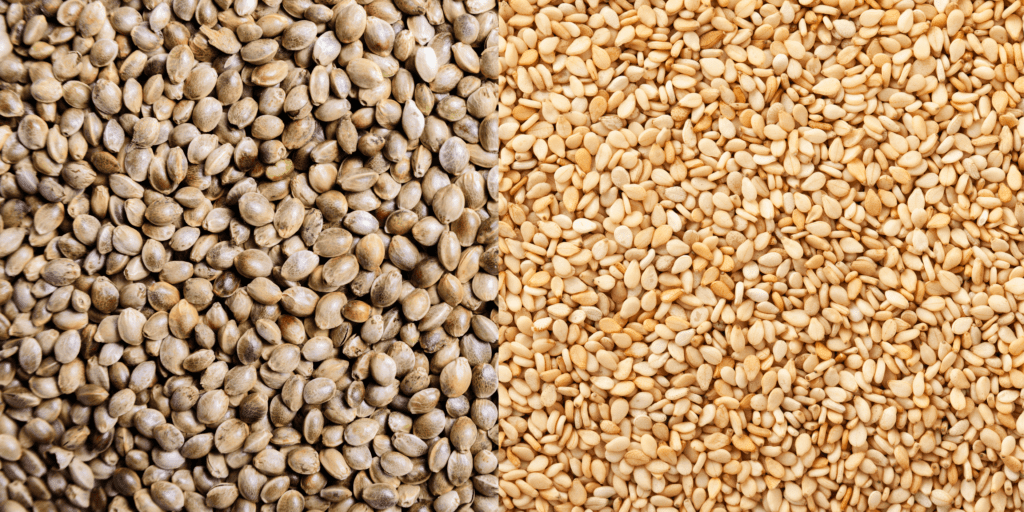
| Nutritional Factors | Hemp Seeds | Sesame Seeds |
|---|---|---|
| Protein (per 30g) | 10g | 5g |
| Carbohydrates (per 30g) | 2g | 6g |
| Fats (per 30g) | 15g | 14g |
| Omega-3 Fatty Acids | High | Low |
| Omega-6 Fatty Acids | High | High |
| Calcium | Moderate | High |
| Magnesium | High | Moderate |
| Iron | High | Low |
| Vitamin E | Moderate | High |
In this section, we’ll pit hemp seeds against sesame seeds in a head-to-head nutritional showdown. We’ll compare their macronutrient ratios, fatty acid profiles, and vitamin and mineral content to help you make an informed decision on which seed best suits your dietary needs.
Comparison of Macronutrient Ratios
When it comes to macronutrient ratios, hemp seeds and sesame seeds have distinct profiles. Hemp seeds are a higher source of protein, making them ideal for those looking to increase their protein intake. On the other hand, sesame seeds are high in carbohydrate content, making them suitable for those who are not particularly focused on protein.
Differences in Omega-3 and Omega-6 Fatty Acids
Both seeds offer essential fatty acids, but their profiles differ significantly. Hemp seeds are rich in both omega-3 and omega-6 fatty acids, making them a balanced choice for heart and brain health. Sesame seeds, on the other hand, are predominantly rich in omega-6 fatty acids, which are essential but should be balanced with omega-3s for optimal health.
Vitamin and Mineral Content
Both seeds are nutrient-dense, but they excel in different areas. Hemp seeds are high in magnesium, calcium, and iron, while sesame seeds are an excellent source of calcium and also provide good amounts of magnesium and zinc.
Versatility and Uses for Hemp Seeds and Sesame Seeds

How to Incorporate Hemp Seeds and Sesame Seeds into Your Diet
Both hemp seeds and sesame seeds are incredibly versatile and can be easily incorporated into various dishes. Whether you’re a culinary novice or a seasoned chef, these seeds offer a plethora of options for enhancing your meals and snacks.
Forms of Hemp Seeds and Sesame Seeds
- Hemp Seeds: Available as whole seeds, hulled seeds (also known as hemp hearts), hemp seed oil, and hemp protein powder.
- Sesame Seeds: Available as whole seeds, hulled seeds, sesame oil, sesame seed powder, and tahini (a paste made from ground sesame seeds).
Ways to Use Hemp Seeds
- Sprinkle on Salads: Hemp hearts add a nutty flavor and extra crunch to your salads.
- Smoothies: Blend hemp seeds or hemp protein powder into your favorite smoothies for a protein boost.
- Baking: Use hemp seed flour or whole hemp seeds in muffins, bread, and cookies.
- Hemp Seed Oil: Ideal for salad dressings or drizzling over cooked vegetables.
- Snacks: Mix hemp seeds into yogurt or oatmeal for a nutritious snack.
🧑🍳 For more cooking ideas and inspiration, check out our guide on How to Cook with Hemp Hearts.
Ways to Use Sesame Seeds
- Tahini: This sesame seed paste is a key ingredient in hummus and can also be used in salad dressings.
- Sesame Oil: Adds a rich, nutty flavor to stir-fries and marinades.
- Garnish: Sprinkle sesame seeds over rice dishes, stir-fries, and baked goods for added texture and flavor.
- Baking: Incorporate sesame seeds into bread, cookies, and pastries.
- Snacks: Toasted sesame seeds can be eaten on their own or mixed with nuts for a healthy snack.
Black Sesame Seeds: A Unique Variant Worth Considering
While discussing sesame seeds, it’s worth mentioning a special variant: black sesame seeds. These seeds are not just a different hue but offer unique nutritional properties and uses compared to their beige counterparts.
Why Differentiate Between Regular and Black Sesame Seeds?
- Nutritional Profile: Black sesame seeds are generally considered to have a higher antioxidant content. They are also particularly rich in calcium and iron, making them a valuable addition to your diet.
- Flavor Profile: The black variety has a slightly stronger, nuttier flavor compared to regular sesame seeds, adding a unique twist to your dishes.
- Culinary Uses: Black sesame seeds are often used in specific types of dishes, such as sushi rolls and certain desserts, to add both color and flavor. Their striking appearance can elevate the visual appeal of a dish.
- Aesthetic Appeal: The contrasting colors between regular and black sesame seeds can make dishes visually more appealing, especially when used as a garnish.
- Traditional Medicine: In some cultures, black sesame seeds are considered to have medicinal properties, such as anti-aging benefits. Incorporating them into your diet could offer more than just flavor.
By understanding the unique attributes of black sesame seeds, you can make more informed choices when incorporating sesame seeds into your diet.
FAQ
Conclusion
After a thorough examination, it’s clear that both hemp seeds and sesame seeds have their own unique nutritional profiles and health benefits. Hemp seeds are a higher source of protein and offer a balanced fatty acid profile, making them ideal for those focusing on protein intake and heart health. Sesame seeds, with their high calcium content, are a great option for those focusing on bone health.
Your choice between hemp seeds and sesame seeds ultimately depends on your specific dietary needs and nutritional goals. Both seeds are incredibly versatile and can be a valuable addition to a healthy diet.

